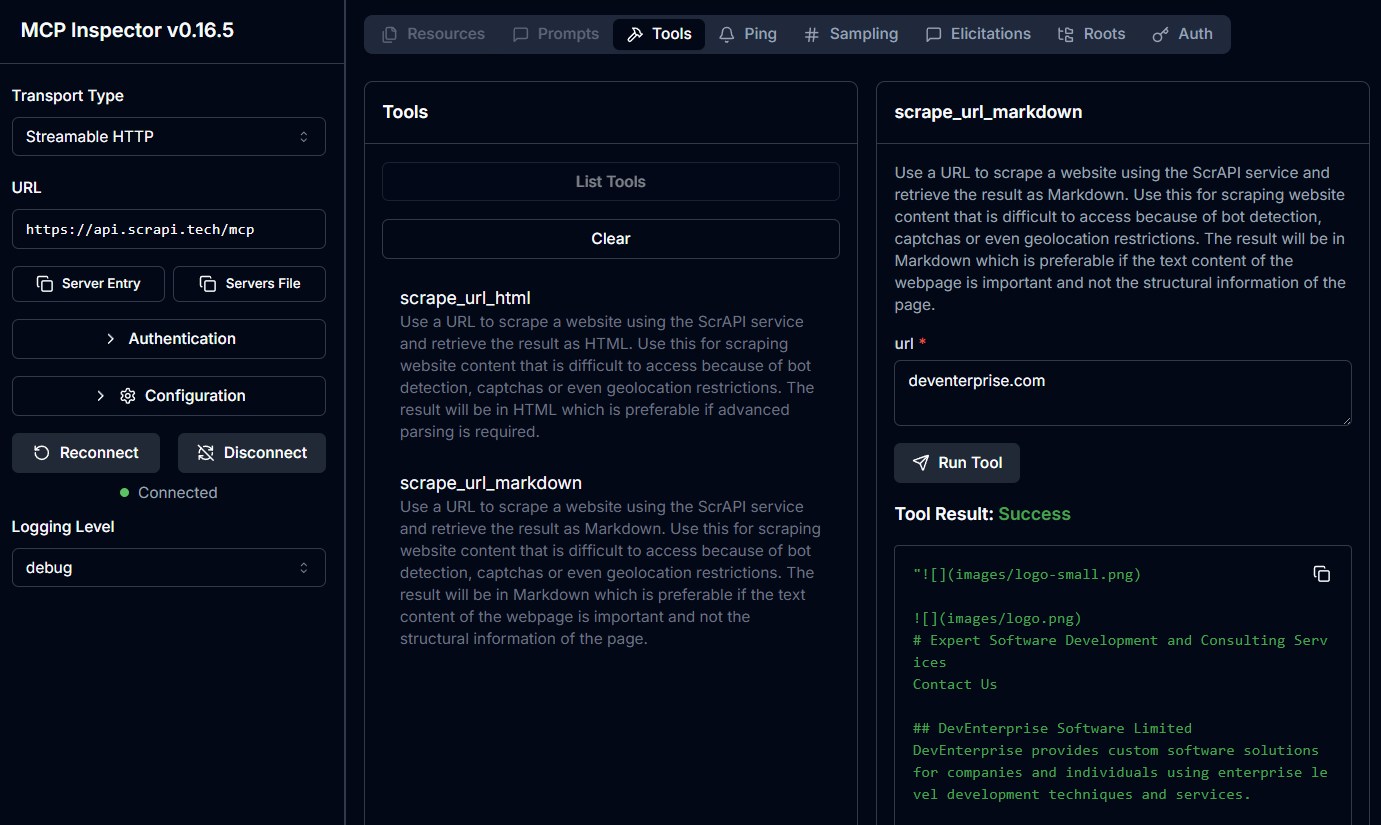About
The ScrAPI MCP Server exposes web‑scraping capabilities via the Model Context Protocol, allowing clients to retrieve page content as HTML or Markdown. It supports ScrAPI’s advanced anti‑bot features and can be run locally or accessed through a cloud endpoint.
Capabilities

Overview
ScrAPI MCP Server is a specialized Model Context Protocol (MCP) endpoint that bridges the powerful web‑scraping capabilities of ScrAPI with AI assistants such as Claude. It solves a common pain point for developers: reliably retrieving content from sites that employ anti‑bot measures, captchas, or geo‑restrictions. By delegating the heavy lifting of navigating headless browsers and handling authentication to ScrAPI, the server delivers clean HTML or Markdown payloads directly to an AI workflow.
What it does and why it matters
The server exposes two intuitive tools— and . Each accepts a single URL parameter, forwards the request to ScrAPI’s API, and returns either raw HTML or a Markdown‑formatted representation of the page. This abstraction lets AI agents request structured content without needing to write custom scraping logic or manage API keys manually. For developers, it means less boilerplate, fewer edge‑case bugs, and a single point of integration that can be swapped out or upgraded independently from the rest of their stack.
Key features
- Dual output formats: HTML for full structural access or Markdown when only the readable text is required.
- Anti‑bot resilience: ScrAPI’s infrastructure bypasses common bot detection mechanisms, ensuring consistent success rates.
- Rate‑limit friendly: Optional API key support unlocks higher concurrency and daily quotas, while unauthenticated usage still offers a modest free tier.
- Cloud‑ready: A hosted SSE endpoint () and HTTP stream make it easy to connect from any client without maintaining a local Docker instance.
- MCP‑Inspector compatibility: The server can be tested and visualized directly in the MCP Inspector, providing instant feedback on tool availability and response structure.
Real‑world use cases
- Data aggregation: Collect product listings, pricing, or reviews from e‑commerce sites for market analysis.
- Content curation: Pull articles or blog posts into a knowledge base while preserving formatting.
- SEO monitoring: Retrieve page content and meta tags to track changes over time.
- Compliance checks: Verify that public-facing pages meet regulatory requirements by automating content extraction.
- Rapid prototyping: Allow an AI assistant to answer user queries about live web pages without exposing internal scraping logic.
Integration with AI workflows
In practice, an AI assistant can call or as part of a larger prompt. The returned text can be parsed, summarized, or fed into downstream tools (e.g., NLP models) with minimal friction. Because the MCP server follows standard resource and tool conventions, it plugs seamlessly into any client that understands MCP—whether that’s Claude Desktop, a custom application, or the MCP Inspector for debugging.
Standout advantages
- Zero‑maintenance scraping: The heavy lifting is handled by ScrAPI’s managed service, so developers don’t need to maintain headless browsers or proxy pools.
- Flexible deployment: Run locally via Docker, use the cloud endpoint, or integrate directly into existing MCP infrastructures.
- Open‑source and MIT licensed: Encourages community contributions, auditability, and easy incorporation into proprietary solutions.
Overall, ScrAPI MCP Server delivers a turnkey solution for integrating sophisticated web‑scraping into AI workflows, enabling developers to focus on higher‑level logic while reliably extracting data from the modern web.
Related Servers
Netdata
Real‑time infrastructure monitoring for every metric, every second.
Awesome MCP Servers
Curated list of production-ready Model Context Protocol servers
JumpServer
Browser‑based, open‑source privileged access management
OpenTofu
Infrastructure as Code for secure, efficient cloud management
FastAPI-MCP
Expose FastAPI endpoints as MCP tools with built‑in auth
Pipedream MCP Server
Event‑driven integration platform for developers
Weekly Views
Server Health
Information
Tags
Explore More Servers
Prokerala Astrology MCP Server
Vedic astrology services via API and chat
Redmine MCP Server
Integrate Redmine Issues into Claude with a Lightweight MCP Server
Claude Web Scraper MCP
Connect Claude to a local eGet web scraper
Stitch AI MCP Server
Decentralized memory hub for AI agents
MCP Playground Server
AI Agent Context Manager for Rapid Prototyping
MCP Server Curio
Filecoin Curio project MCP server